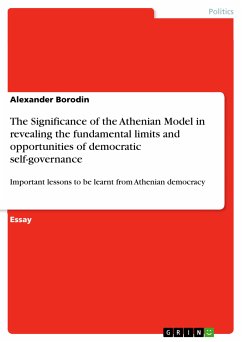Essay from the year 2012 in the subject Politics - Political Theory and the History of Ideas Journal, grade: 75, University of Essex (Department of Goverment ), language: English, abstract: In many ways Athenian assembly democracy constitutes a genuine as well as extreme model in democratic thought. This has to do on the one hand with its remarkable institutional features and on the other hand with its extensive practices of public participation. In what will follow, we should therefore at first look at the structure and the interrelations of the key organs of the Athenian system as a form of government. Our understanding of the mechanisms of these institutions will serve us as a basis to enquire critically into their actual performance as well as their significance for Athenian democracy as a whole. Investigating the principles behind the institutions such as selection by lot, very short periods of office or reliance on public opinion will then allow us to reflect on their implications for modern discourse on democratic ideas. It is my intention to illustrate how the Athenian system and particularly the broad public deliberation it relied on, exemplifies the necessary criteria which have to be achieved in order to strengthen rather than to undermine democracy. Whereas the Athenian model needs to be limited in some respects, for instance to avoid violations of the rule of law, it has to be furthered in other respects such as the enlightenment of the wide public.








